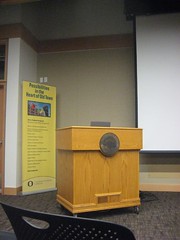 This week’s column is a public entreaty to all you lawyers out there who will bravely step onto the podium to make a presentation or “say a few words in closing.” I recently attended a lunch & learn in a feeble attempt to make a dent in my law society CPD requirements. The first speaker spoke in stunning detail about a technical point of law related to an obscure statutory interpretation (and I am being deliberately vague to protect the obtuse). Mercifully, she only got through the first 24 of her 75 slides. By that time, most of the audience had sought refuge in their Blackberrys. The guy next to me was playing Brickbreaker. The second speaker mumbled unintelligibly to himself for 40 minutes. His presentation may have had something to do with Competition Law or Fukushima. I couldn’t be sure.
This week’s column is a public entreaty to all you lawyers out there who will bravely step onto the podium to make a presentation or “say a few words in closing.” I recently attended a lunch & learn in a feeble attempt to make a dent in my law society CPD requirements. The first speaker spoke in stunning detail about a technical point of law related to an obscure statutory interpretation (and I am being deliberately vague to protect the obtuse). Mercifully, she only got through the first 24 of her 75 slides. By that time, most of the audience had sought refuge in their Blackberrys. The guy next to me was playing Brickbreaker. The second speaker mumbled unintelligibly to himself for 40 minutes. His presentation may have had something to do with Competition Law or Fukushima. I couldn’t be sure.
Just when we thought we were home free, some wretched fellow decided to ask a question that rivalled the second presentation. This called to mind the caption of a New Yorker cartoon: “We’d now like to open the floor to shorter speeches disguised as questions.” I too have a question: Is there anything more terrifying than a “legal expert” behind a podium?
In my years of practice, I have had occasion to observe speakers in boardrooms, in courtrooms, at conferences, making technical presentations or chairing panels. When it comes to public speaking, our downfall, as lawyers, is our failure or obstinate refusal to accept the limitations of our audience. You see, an audience is limited in two important respects. First, an audience has limited patience (a euphemism for attention span). Every speaker begins with a certain amount of goodwill from the audience. When an audience’s patience has been exhausted by a long-winded speaker who refuses to get to the point, goodwill turns to resentment…or worse.
Second, an audience has a limited capacity (and desire) to absorb information. Studies have demonstrated that even a lawyer’s superior brain is capable of retaining a fraction of information conveyed orally. In short, think of the average audience as you would a village idiot who could snap at any instant. You need to deliver your message quickly and clearly. You need to be selective and careful about how you communicate with the idiot to ensure that he hobbles away having understood the basic message while you remain unscathed.
Like getting back in shape after the holidays, public speaking is simple in theory but hard to do. What constitutes effective public speaking? In three words: brevity, clarity and impact. A speaker should spend almost as much time on delivery as she does on content. Really. A good speaker knows the limitations of her audience. She can distil the exquisitely complex into a compelling message. A great speaker is always conversational. She’s not “covering material” or lecturing; she is having a conversation with her audience. She maintains constant eye contact with her audience. What good are your 75 slides if the audience has no idea what you’ve been talking about for the past hour? Impact means a shock of energy experienced over a short time period. PowerPoint is not a substitute for impact. So, dear lawyers, please step away from the PowerPoint and get to the point.
Sandra Rosier is a former Supreme Court of Canada clerk who has worked at large firms in Toronto and Boston. Having come to her senses, Sandra currently works as a tax advisor at a Toronto-based organization. Her etiquette column for lawyers appears every other Monday at lawandstyle.ca. Got a question for Sandra? Email us.
Photo by Jenny Cestnik

